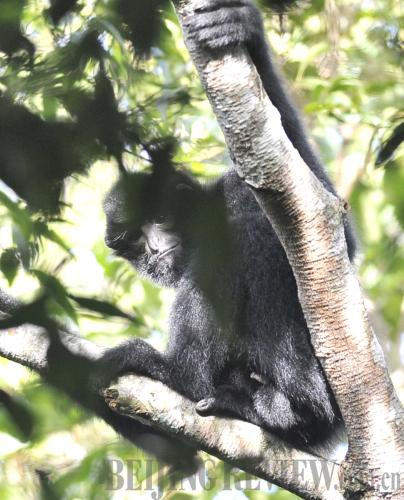|
 |
|
RARE SPECIES: An international forum on the protection of the Hainan Gibbon is held in Bo'ao, south China's Hainan Province, from March 18 to 20. The Hainan Gibbon, the rarest primate and one of the most endangered mammals, has a total population of only 23, all living in Hainan's Tropical Rainforest Reserve (JIANG ENYU) |
Anti-Graft Inspections
The top discipline watchdog of the Communist Party of China (CPC) on March 25 started a new round of inspections of officials to expose corruption nationwide.
Inspectors will be sent to the provincial-level regions of Beijing, Tianjin, Liaoning, Fujian, Shandong, Henan, Hainan, Gansu, Ningxia, Xinjiang, and the Xinjiang Production and Construction Corps, the Central Commission for Discipline Inspection of the CPC said in a statement.
The commission will also send anti-graft teams to the Ministry of Science and Technology, Fudan University and the China Oil and Foodstuffs Co., it added.
The inspection aims to uncover harmful behavior by officials, including trading power for money, abusing power, and bribery, as well as adverse work practices such as formalism, bureaucracy, hedonism and extravagance.
The CPC began routinely sending teams to oversee the performance of officials in 2003, and the practice was formally written into the Party's Constitution five years later.
Medical Reform
China will inject more funds and let the market play a bigger role in reforming its medical sector, according to an executive meeting of the State Council on March 25.
The country will work to establish a universal medical insurance system, speed up reform in public hospitals, and relax market entry requirements for the private sector to build health institutions in an orderly manner, said a statement issued after the meeting.
It was decided at the meeting that a national database will be set up to facilitate the reimbursement of medical costs for patients across different regions, and a public hospital reform program will be expanded to cover more than half of all county-level hospitals.
The scale of public hospitals, which provide 90 percent of China's medical services, will be controlled and medical resources will be optimized, according to the meeting.
Non-public hospitals and public hospitals will be treated equally in terms of access to medical insurance programs and other qualifications.
The State Council has also announced that it will raise the percentage of shares that foreigners may own in medical joint ventures and improve welfare for rural doctors.
Eco-Promotion
China has established a special committee to take part in the Future Earth program and strengthen international cooperation in the building of an eco-civilization.
The Chinese National Committee for Future Earth (CNC-FE) was founded on March 21 in Beijing and is sponsored by the China Association for Science and Technology.
The CNC-FE aims to organize Chinese scientists to participate in the Future Earth (2014-23) project and make full use of international resources to boost China's technological level and policy making in the construction of an eco-civilization, said Qin Dahe, Chairman of the CNC-FE.
The committee is made up of more than 40 experts from the fields of natural science, engineering, social science, and media.
Under the Future Earth project, the CNC-FE will focus on major subjects of public and government concern, including atmospheric pollution, urbanization's impact on the environment, energy supply and natural disaster warning in Asia.
The Future Earth (2014-23) program was jointly launched by the International Council of Scientific Unions, the International Social Science Council and the United Nations. It aims to gather global resources to try to find solutions for the sustainable development of the Earth.
| 